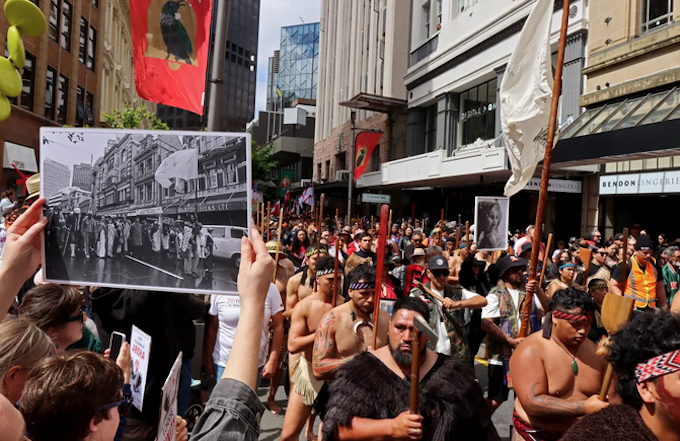
For almost six decades photographer John Miller (Ngāpuhi) has been a protest photographer in Aotearoa New Zealand.
From his first photographs of an anti-Vietnam War protest on Auckland’s Albert Street as a high school student in 1967, to Hīkoi mō te Tiriti last week, Miller has focused much of his work on the faces of dissent.
He spoke of his experiences over the years in an interview broadcast today on RNZ’s Culture 101 programme with presenter Susana Lei’ataua.

Miller joined Hīkoi mō te Tiriti at Waitangi Park in Pōneke Wellington last Tuesday, November 19, ahead of its final walk to Parliament’s grounds.
“It was quite an incredible occasion, so many people,” 74-year-old Miller says.
“Many more than 1975 and 2004. Also social media has a much more influential part to play in these sorts of events these days, and also drone technology . . .
“I had to avoid one on the corner of Manners and Willis Streets flying around us as the Hīkoi was passing by.
“We ended up running up Wakefield Street which is parallel to Courtenay Place to get ahead of the march and we joined the march at the Taranaki Street Manners Street intersection and we managed to get in front of it.”
Comparing Hīkoi mō te Tiriti with his experience of the 1975 Māori Land March led by Dame Whina Cooper, Miller noted there were a lot more people involved.
“During the 1975 Hīkoi the only flag that was in that march was the actual white land march flag — the Pou Whenua — no other flags at all. And there were no placards, no, nothing like that.”



There were more flags and placards in the Foreshore and Seabed March in 2004.
“Of course, this time it was a veritable absolute forest of Tino Rangatira flags and the 1835 flag and many other flags,” Miller says.
“Te Mana Motuhake o Tuhoe flags were there, even Palestinian flags of course, so it was a much more colourful occasion.”

Miller tried to replicate photos he took in 1975 and 2004: “However this particular time I actually was under a technical disadvantage because one of my lenses stopped working and I had to shoot this whole event in Wellington using just a wide angle lens so that forced me to change my approach.”
Miller and his daughter, Rere, were with the Hīkoi in front of the Beehive.
“I had no idea that there were so many people sort of outside who couldn’t get in and I only realised afterwards when we saw the drone footage.”

This article is republished under a community partnership agreement with RNZ.












































